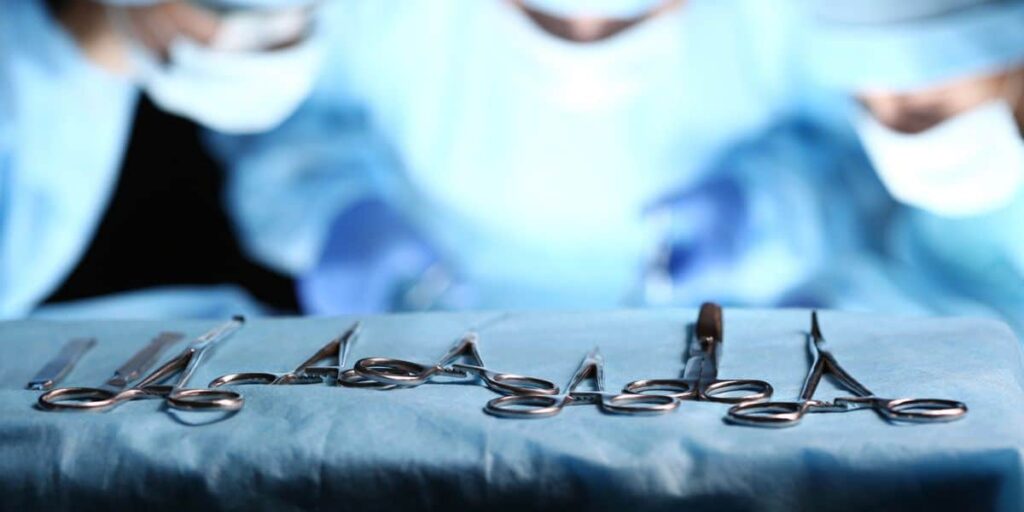What is an ovarian cystectomy?
An ovarian cystectomy is a surgical procedure to remove cysts on the ovaries. An ovarian cyst is a sac of fluid that can develop inside the ovaries.
Most ovarian cysts are asymptomatic. However, if a cyst does cause symptoms, you may feel pressure, bloating, swelling, or pain in the lower abdomen on the side of the cyst.
In most cases, these cysts disappear after a few months, and a follow-up ultrasound scan may be used to confirm this.
What causes ovarian cysts?
Common causes of ovarian cysts include:
- Polycystic ovary syndrome (PCOS)
- Ovulation
- Endometriosis
- Pelvic inflammatory disease
- Cancer
When is a laparoscopic cystectomy performed?
Ovarian cysts are fairly common and usually resolve on their own. However, some cysts can cause infertility, pain, or become cancerous.
A cyst removal may be a recommended treatment option if:
- The patient has cysts or other masses in both ovaries.
- An ovarian cyst has not shrunk or disappeared after three months.
- A cyst is larger than three inches in diameter.
- A cyst appears to be abnormal or malignant.
- Your doctor suspects ovarian cancer.
Your OB/GYN may also recommend an ovarian cystectomy if you:
- Take birth control pills.
- Have not yet started your period (children or teenagers).
- Have already undergone menopause.
What is a laparoscopic ovarian cystectomy?
For too long, the only way to perform surgery on reproductive organs was laparotomy (open surgery). This surgery is a traditional, invasive surgery; the surgeon makes a long incision in the abdominal wall through which they can access the ovaries and remove the cysts.
Dr. Aliabadi focuses on laparoscopic surgery, which is minimally invasive and requires only a few small incisions in the lower abdomen. A thin, flexible camera is inserted into the abdomen, allowing the surgeon to see the ovary and cysts. Long, thin surgical instruments are then expertly inserted into the small cuts to carefully separate the cysts from the healthy ovarian tissue.
Both surgeries are performed under general anesthesia. However, abdominal surgery generally carries greater risks of infection or tissue damage.
Laparoscopic minimally invasive surgeries usually have quicker healing times and less pain.
For more information about our advanced minimally invasive outpatient ovarian cystectomies surgery and procedures, please visit our Outpatient Hysterectomy Center website.
What are the benefits of a cystectomy?
- Removes painful cysts
- Reduces cancer risk: This is particularly important for cysts that develop after menopause, as they are more likely to be cancerous.
- Prevents complications:
- Ruptured ovarian cyst: Avoids the risk of the cyst breaking open, which can cause severe pain.
- Ovarian torsion: Prevents the cyst from causing the ovary to twist upon itself, a painful condition that can cut off blood flow and potentially lead to the loss of the ovary.

What are the risks of an ovarian cystectomy?
An ovarian cystectomy is a relatively safe procedure, but every surgery carries some risk. Risks of ovarian cystectomy include:
- Recurring ovarian cysts
- Pelvic pain
- Infection
- Adhesions – scar tissue that causes the pelvic organs to stick together
- Damage to the bladder, fallopian tubes (uterine tubes), or other pelvic tissue
- Call your healthcare provider if you experience fever, severe abdominal pain, heavy bleeding, or discharge from your incisions.
What is ovarian cystectomy recovery time?
Depending on your surgeon, you may need a hospital stay for a few days. In our Los Angeles minimally invasive surgical practice, our procedures are always outpatient, and you go home the same day. As soon as you can, stand up and walk for a few minutes to improve your circulation. This will help decrease the risk of blood clots in the legs.
In the days and weeks following your surgery, get plenty of rest and do some light exercise. Avoid heavy lifting or rigorous exercise.
If you have had abdominal surgery, you should be able to return to normal activities after 4-6 weeks. You may fully recover from a laparoscopy as soon as two weeks after the procedure.
Who is not a candidate for a cystectomy?
A patient may not be a good candidate for an ovarian cystectomy if they have certain medical conditions or factors, such as:
- Non-symptomatic or small functional cysts: Small, asymptomatic functional cysts typically resolve on their own and may not require surgery.
- Severe medical conditions: Patients with severe cardiovascular, respiratory, or other serious systemic conditions may not be ideal candidates for surgery due to the increased risk of complications.
- High risk of malignancy: If there’s a significant risk that the cyst is malignant, a more extensive procedure, like an oophorectomy (removal of the entire ovary), may be recommended instead of a cystectomy.
- Pregnancy: While some cysts are managed surgically during pregnancy, depending on the cyst type and the stage of pregnancy, surgery might be deferred to avoid risks to the mother and fetus unless there’s an immediate danger.
Blood tests, chest X-rays, and an electrocardiogram (EKG) may be ordered before the surgery, as well as imaging tests to assess your overall health and the size of the cyst.
Why choose Dr. Aliabadi
As one of the nation’s leading OB/GYNs, Dr. Thaïs Aliabadi offers the best in gynecological and obstetric care. With her warm, professional women’s health team, Dr. Aliabadi supports women through all phases of life and fosters a special one-on-one relationship between patient and doctor.
Highly trained and honored by the medical community, Dr. Aliabadi is certified by the American Board of Obstetrics and Gynecology and a Diplomat of the American College of Obstetricians and Gynecologists. She is also a recognized leader in endometriosis treatment and has even taught minimally invasive laparoscopic surgery to other surgeons nationwide.
We invite you to establish care with Dr. Aliabadi. Please make an appointment online or call us at (844) 863-6700.
The gynecology practice of Dr. Thais Aliabadi in Beverly Hills is conveniently located for patients throughout Southern California and the Los Angeles area. We are near Beverly Hills, West Hollywood, Santa Monica, West Los Angeles, Culver City, Hollywood, Venice, Marina del Rey, Malibu, Manhattan Beach, and Downtown Los Angeles.
An endometrioma is a type of ovarian cyst formed when endometrial tissue, which normally lines the uterus, grows inside the ovary. It is often filled with old blood and is sometimes referred to as a “chocolate cyst.”
A functional cyst is an ovarian cyst that develops during a woman’s menstrual cycle and is usually harmless. It forms when a follicle (a small sac holding an egg) either doesn’t release the egg as it should or doesn’t dissolve after releasing the egg, resulting in a fluid-filled sac that can grow and eventually shrink. Functional cysts are common and typically resolve without surgical removal.
A corpus luteum cyst forms after an egg has been released from the follicle during ovulation. These cysts are usually benign and often resolve on their own without treatment, but they can sometimes cause pain or other symptoms if they grow large or rupture.
A dermoid cyst is a benign ovarian cyst that contains tissue such as hair, skin, teeth, or fat. It is typically slow-growing and can occur in women of all ages, but it is most common in women of reproductive age.
















